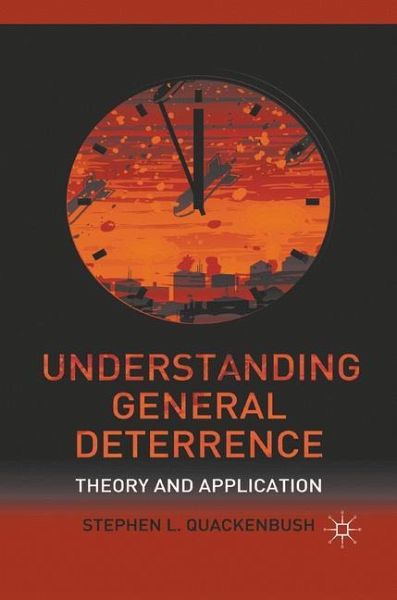
Versandkostenfrei!
Versandfertig in 6-10 Tagen
Weitere Ausgaben:

PAYBACK Punkte
46 °P sammeln!





This book bridges the divide between formal and quantitative studies of deterrence by empirically testing and extending perfect deterrence theory. The author focuses on general deterrence, which relates to managing relations between states at all times, not only during crises.
STEPHEN L. QUACKENBUSH Assistant Professor in the Department of Political Science at the University of Missouri, USA.
Produktdetails
- Verlag: Palgrave Macmillan / Palgrave Macmillan US / Springer, Berlin
- Artikelnr. des Verlages: 978-1-349-29633-0
- 2011
- Seitenzahl: 224
- Erscheinungstermin: 26. Oktober 2011
- Englisch
- Abmessung: 229mm x 152mm x 13mm
- Gewicht: 332g
- ISBN-13: 9781349296330
- ISBN-10: 1349296333
- Artikelnr.: 45074673
Herstellerkennzeichnung
Palgrave Macmillan
Tiergartenstr. 17
69121 Heidelberg
ProductSafety@springernature.com
"This is the most sophisticated and ambitious book to be written on the elusive topic of general deterrence that I am aware of. Stephen L. Quackenbush masterfully integrates formal theory with quantitative empirical tests in a probing and rigorous analysis that generates many insights into the onset of military confrontations, the reliability of alliances, and the durability of conflict settlements. This book is essential reading for all scholars of deterrence and international conflict." - Paul Huth, University of Maryland"A tour de force of theory development and testing. In this highly innovative work, Stephen L. Quackenbush pushes hard at the frontiers of theoretical knowledge about the dynamics of deterrence. Along the way he confronts
Mehr anzeigen
head on a number of thorny methodological issues that have plagued previous empirical studies and offers compelling solutions to them. The next wave of scholarship on deterrence will have to start here." - Frank C. Zagare, University at Buffalo, SUNY"Understanding General Deterrence is a significant contribution to the study of international conflict processes. Quackenbush succeeds in bridging the longstanding gap between formal and quantitative analysis of general deterrence. His clear and well-organized exposition reaches that goal in a number of ways. The concept of politically active dyads is developed and applied effectively to deal with the problem of identifying opportunity in general deterrence. On the game-theoretic side, the modeling of all three actors in extended deterrence provides the most rigorous and complete treatment of the question to date. This and other stages of the work produce ideas beyond intuition; for example, under extended deterrence, the likely target of an attack by a challenger is the more reliable of the defending allies, with the goal being to keep the less reliable ally on the sideline and prevent a multilateral war. The well-integrated theorizing, data analysis, and case illustrations in this study culminate in a fascinating range of implications for foreign policy. This work will encourage renewed interest in general deterrence, which Quackenbush demonstrates to be relevant to the management and resolution of any number of other issues." - Patrick James, University of Southern California
Schließen
Für dieses Produkt wurde noch keine Bewertung abgegeben. Wir würden uns sehr freuen, wenn du die erste Bewertung schreibst!
Eine Bewertung schreiben
Eine Bewertung schreiben
Andere Kunden interessierten sich für











